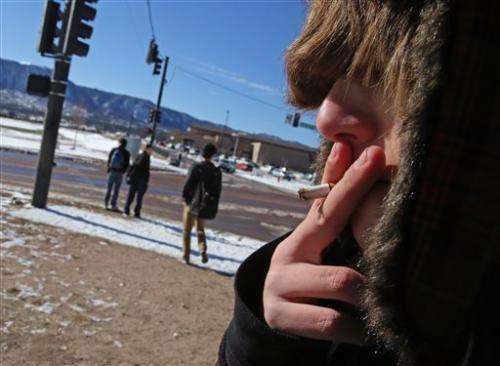A high school student, who preferred not to be identified, smokes a cigarette in a de facto smoking area just off the property of Lewis-Palmer High School, in Monument, Colo., Thursday Feb. 20, 2014. A proposal to raise the tobacco age to 21 in Colorado is up for its first review in the state Legislature. The bipartisan bill would make Colorado the first with a statewide 21-to-smoke law. (AP Photo/Brennan Linsley)
Two Western states with some of America's lowest smoking rates are considering cracking down even more by raising the tobacco age to 21.
Utah and Colorado lawmakers both voted favorably on proposals Thursday to treat tobacco like alcohol and take it away from 18- to 20-year-olds, a move inspired by new research on how many smokers start the habit as teenagers.
Both proposals face several more votes. But they're the furthest any states have gone to curb access to cigarettes by teens. The director of tobacco studies at University College London didn't know of any other countries considering a tobacco age threshold of 21, but he said raising the tobacco age from 16 to 18 in the United Kingdom proved to be "a public health winner."
Altria Group Inc., owner of the biggest U.S. cigarette company, Philip Morris USA, did not immediately provide comment.
A paper published last year in the journal Annals of Internal Medicine said that 9 out of 10 daily smokers in the U.S. have their first cigarette by 18 years of age, and that about 90 percent of cigarettes purchased for minors are obtained by people between 18 and 20 years old.
The Washington-based Campaign For Tobacco-Free Kids advocates the higher smoking age and argues that it could make a serious dent in tobacco deaths down the road.
Armando Peruga, program manager of the World Health Organization's Tobacco Free Initiative, said he supported the U.S. proposal, provided that it would be strictly enforced and that it was accompanied by other tobacco control measures, such as high taxes and smoke-free regulations.
"It needs to be part of a comprehensive policy to counter the tobacco industry's influence on young people," Peruga said.
Four states, including Utah, already require tobacco purchasers to be 19. The others are Alabama, Alaska and New Jersey.
The 21-for-tobacco bills are also pending in state legislatures in Hawaii, Massachusetts and New Jersey. Maryland lawmakers considered and rejected the idea this year. New York City last year raised the tobacco age to 21, as did Hawaii County, Hawaii.
Utah already has the nation's lowest smoking rate, about 12 percent in 2011 according to the Centers for Disease Control and Prevention. Colorado isn't far behind, at about 18 percent in 2011, according to the CDC.
Despite the low rates, health advocates in both states testified that a higher tobacco age could depress the rates even further.
When the legal age of smoking was raised from 16 to 18 in the U.K., there was a significant drop in the number of people who started smoking, University College London's Robert West said.
"The ages from 18 to 21 is a period of huge uptake and even if you're able to delay (teenagers) from starting smoking rather than preventing it altogether, there would be a significant health benefit. You're essentially allowing the rather scrambled adolescent brain to settle down and avoid smoking during that period before they turn 21, after which they may decide they absolutely do not want to smoke anyways," he said.
© 2014 The Associated Press. All rights reserved.




















